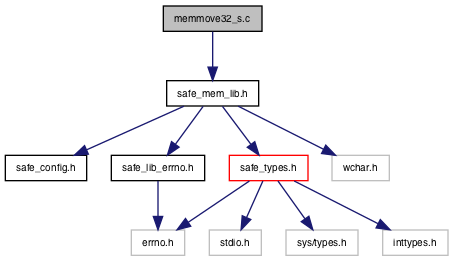memmove32_s.c File Reference
#include "safe_mem_lib.h" Include dependency graph for memmove32_s.c:
Include dependency graph for memmove32_s.c:Functions | |
| EXPORT errno_t | memmove32_s (uint32_t *dest, rsize_t dmax, const uint32_t *src, rsize_t smax) |
| The memmove32_s function copies smax uint32_ts from the region pointed to by src into the region pointed to by dest. More... | |
Function Documentation
◆ memmove32_s()
The memmove32_s function copies smax uint32_ts from the region pointed to by src into the region pointed to by dest.
This copying takes place as if the smax uint32_ts from the region pointed to by src are first copied into a temporary array of smax uint32_ts that does not overlap the regions pointed to by dest or src, and then the smax uint32_ts from the temporary array are copied into the region pointed to by dest.
- Remarks
- EXTENSION TO ISO/IEC JTC1 SC22 WG14 N1172, Programming languages, environments and system software interfaces, Extensions to the C Library, Part I: Bounds-checking interfaces
- Parameters
-
[out] dest pointer to the memory that will be replaced by src. [in] dmax maximum length of the resulting dest, in bytes [in] src pointer to the memory that will be copied to dest [in] smax maximum number bytes of src that can be copied
- Precondition
- Neither dest nor src shall be a null pointer.
- dmax shall not be 0.
- dmax shall not be greater than RSIZE_MAX_MEM.
- smax shall not be greater than dmax.
- Returns
- If there is a runtime-constraint violation, the memmove_s function stores zeros in the first dmax characters of the region pointed to by dest if dest is not a null pointer and dmax is not greater than RSIZE_MAX_MEM.
- Return values
-
EOK when operation is successful ESNULLP when dst/src is NULL POINTER ESZEROL when dmax = ZERO. Before C11 also with smax = ZERO ESLEMAX when dmax/smax > RSIZE_MAX_MEM ESNOSPC when dmax < smax
- See also
- memmove_s(), memmove16_s(), memcpy_s(), memcpy16_s() memcpy32_s()
